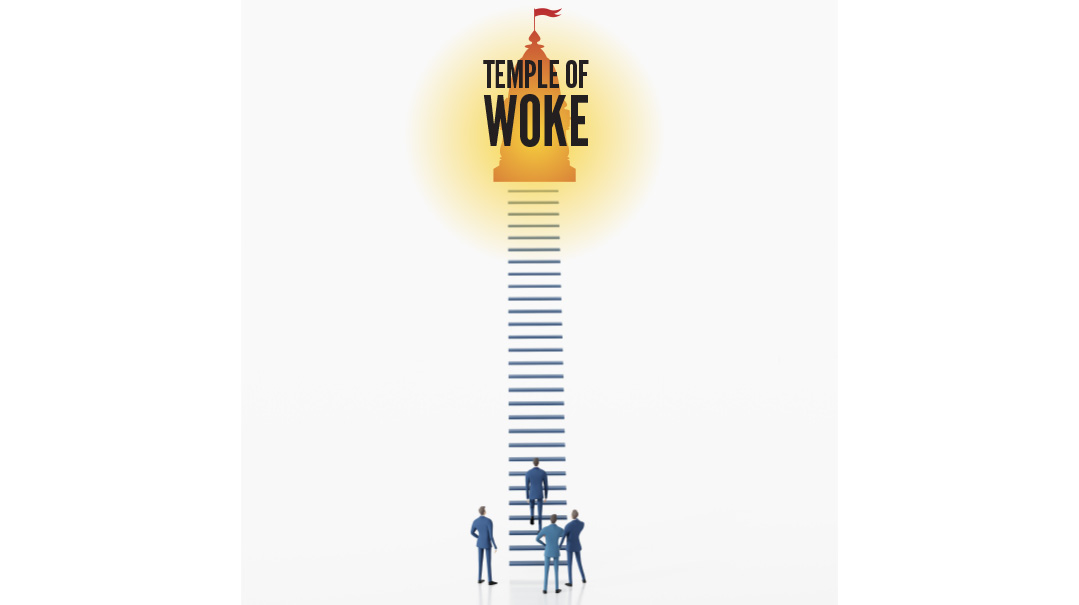A Religion Called Woke

Now that the Christian holidays count more as an economic event than a religious one, we’ve exchanged one set of problems for another

TO
generations of medieval Jews, for whom the Christian holidays meant the possibility of violence at the hands of a peasant mob streaming out of church, Xmas’s transformation into a secular shop-fest would have been the stuff of dreams.
After all, if Hans from Bavaria was busy with the New Year sales, he would have less time for a pogrom after a particularly stirring sermon.
With a little help from secularization and December shopping, the tolling of church bells no longer sends a shiver down Jewish spines.
That we’re now in a post-religious age is a matter of polling, not just consumption patterns. Even in America, land of the mega-church, a 2020 Gallup poll found that church membership fell below 50 percent for the first time since the survey began in 1937 — a nosedive of 20 percent since 1999.
But now that the Christian holidays count more as an economic event than a religious one, we’ve exchanged one set of problems for another.
Belief abhors a vacuum, and the decline of religion across the West has opened the door to a secularism every bit as unreasoning, dogmatic, and inquisitorial as the religion it replaced.
At the business end of the new secularism is woke ideology — a catch-all creed signifying a set of progressive beliefs on everything from race to climate change and Donald Trump.
For evidence of the new secular unreason, look no further than gender definitions. As British conservative commentator Douglas Murray points out in his recent book The Madness of Crowds, the trans lobby went from fringe movement to mainstream in an astonishingly short span of time.
It beggars belief, but in 2022, stating that gender identity is a fact rooted in biology is enough to get you canceled as a bigot.
The belief in gender fluidity that has conquered elite opinion — and belief it is, because it’s pure delusion — is so weird that future generations will likely recall us moderns much as we ourselves view the ancients who practiced witchcraft.
Dogma is equally a feature of abortion rights. Long a staple of the culture wars, abortion became a rallying cry for liberals after the Supreme Court struck down Roe v. Wade earlier this year.
Over the course of decades, marketing abortion as “pro-choice” succeeded in sanitizing the lethally simple fact at the heart of the madness: Every year in America, large numbers of perfectly viable babies are killed for no good reason.
Progressives would howl at the comparison, but what is the essential difference between the ancient practice of Molech — child sacrifice to appease wrathful gods — and murdering a baby as a lifestyle choice?
But it’s in race ideology that the quasi-religious nature of the progressive belief system shows itself most prominently. As linguist John McWhorter points out in Woke Racism, woke ideology posits an original sin — white privilege; an imperviousness to counter-reason; and an inquisitorial zeal that ends not in burning at the stake, but in being booted from public office and social media.
In any normal world, those empty church pews should not be a Jewish concern.
But we don’t live in a normal world. The radical secularism now feasting off the carcass of Christianity in the West should worry anyone who is repelled by the new religion of woke.
Saudi Stake
Might Bibi the Comeback Kid pull off a peace deal with the Saudis? Extending the Abraham Accords to cover Riyadh would come at a price, and according to Middle East expert Yoni Ben Menachem, the cost would be a Saudi say on what goes on in Har Habayis.
Traditionally, Jordan’s Hashemite dynasty has exercised influence over the Muslim shrines at the site, including by contributing to their upkeep.
But Bibi — whose relations with Jordan’s King Abdullah are toxic — has spied a leverage opportunity by offering the Saudis a role at the site. If true, the offer is significant: the Saudis already control Mecca and Medina — Islam’s two holiest sites — and this would add religious legitimacy to the Wahhabi dynasty that rules Saudi Arabia.
In practice, it’s unlikely that Itamar Ben Gvir — who has campaigned for greater Jewish access to Har Habayis — would welcome a new Saudi role.
But the report is a reminder that Netanyahu’s strategy of vaulting the Palestinians to engage with the big Arab states beyond is back in business.
Dressing Down
There are many ways to parse Volodymyr Zelensky’s lightning visit last week to Washington, and while you’ll find the geopolitical interpretation overleaf, the sartorial aspect deserves footnoting.
As widely reported, Congress had to suspend its dress code of suit and tie to allow Zelensky to speak attired in his wartime uniform of army green sweater.
The Ukrainian leader’s insistence on breaking norms was in keeping with the war theater that the former actor has adapted. But what to make of Congress’s acquiescence?
It’s probably not a stretch to say that in the more formal, pre-casual era of not so long ago, a request like that would never have been made, or granted.
Whatever the political outcome of the visit, Zelensky might have set a historical precedent. If dressing down becomes the norm in a future Congress, it all started with one small man in a green sweater.
0
China’s plan to end the reporting of Covid cases and deaths going forward deserves wider coverage across those sections of the media who looked with admiration on Beijing’s strong-arm efforts to check the pandemic three years ago.
Despite the ferocious tactics deployed against Covid, the official death toll — 5,241 this week — should be treated as a joke, given that the country’s initial reaction to the emergence of the pandemic was cover-up.
But the real lesson for credulous foreigners about China’s abandonment of the zero Covid approach is that even when democracies go badly wrong in handling a crisis, autocracies rarely do better — they’re just good at the cover-up.
(Originally featured in Mishpacha, Issue 942)
Oops! We could not locate your form.







